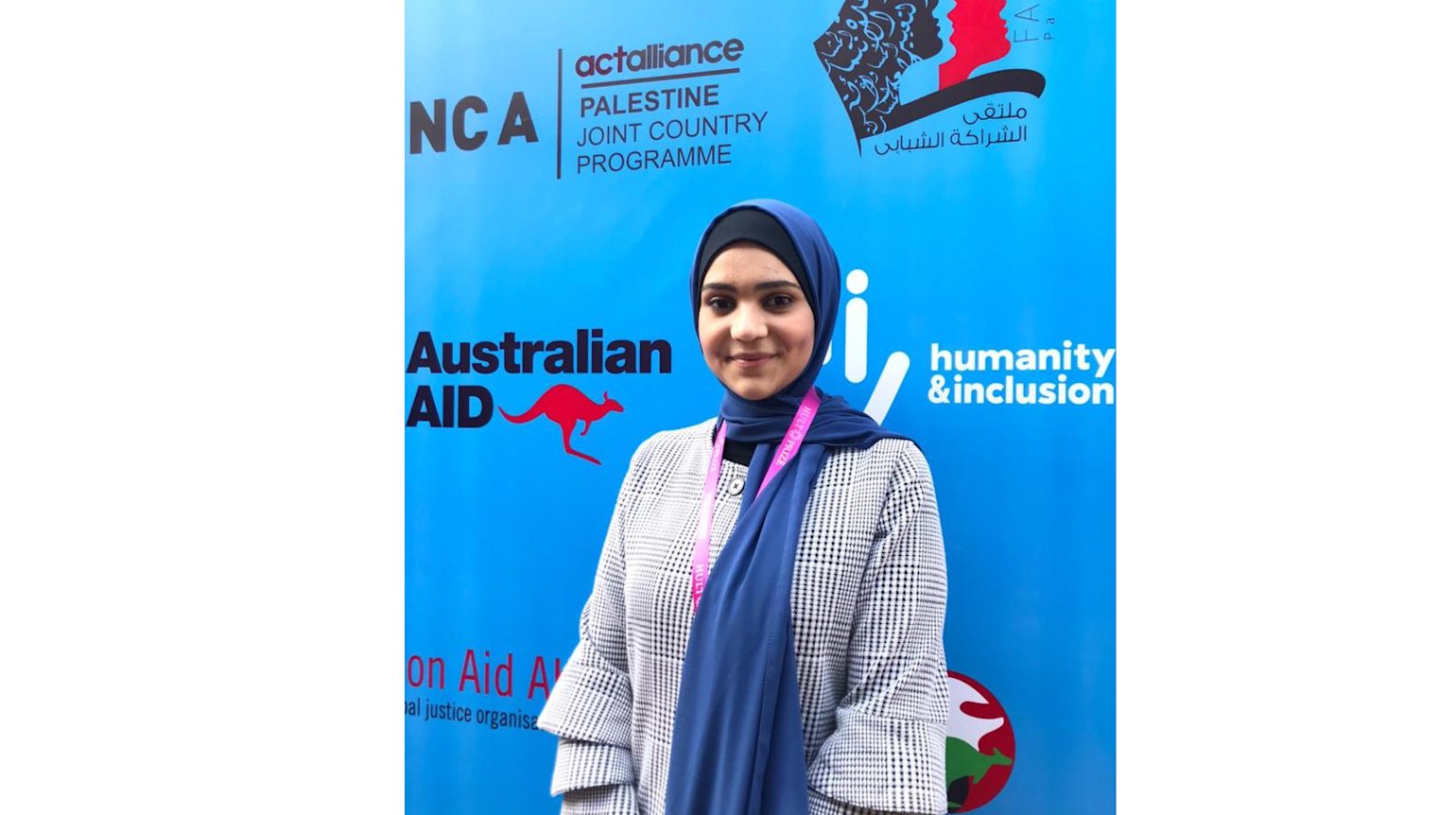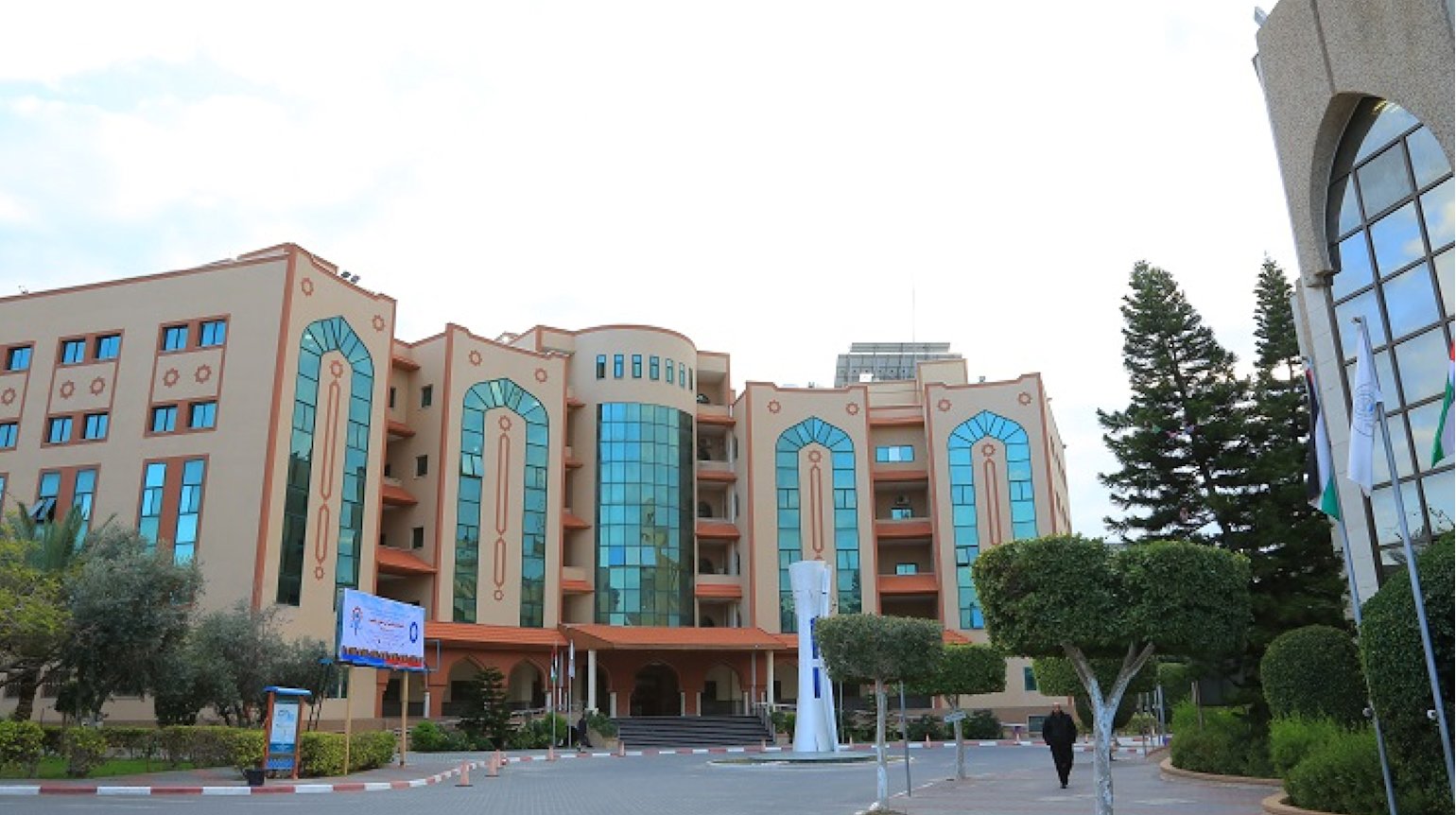Coronavirus (COVID-19) Updates
For the latest COVID-19 information and updates from Qatar Foundation, please visit our Statements page

In the new academic year in Gaza City, Palestinian children check a classroom at a school devastated by conflict.Image source: Majdi Fathi/NurPhoto, via REUTERS
On International Day to Protect Education from Attack, two Palestinian students talk about the suffering they go through on a daily basis
“When we watch exam papers fly in the air in front of us, and students run in panic to the streets to escape and search for their families amid constant bombing. That is when the question ‘how do I succeed in exams?’ unanimously turns into ‘how can I escape death?’, and then we can no longer claim that education is fine.”
That is how Manar Akram, a student of the Islamic University of Gaza, describes the educational experience for students in occupied Palestine, highlighting the daily challenges every student living in a country going through war faces.
Every day is a trial for us. We are constantly afraid, the taxi we take to school could be targeted by the occupying forces, we could be late to school because of road closures due to bombing from the previous night.”
“Every day is a trial for us. We are constantly afraid, the taxi we take to school could be targeted by the occupying forces, we could be late to school because of road closures due to bombing from the previous night or for the safety of our parents while we are in school,” said Akram.
“Rumors spreading on social media about closure of schools due to political issues often instill fear and hesitation, causing students to skip school even if they have important exams.”
Akram also highlighted the hardships faced by students directly affected by a bombing, saying “Getting injured does not guarantee immediate treatment; sometimes, it could take several months, which could mean missing an entire academic year.”
“Sometimes students lose their families and relatives before their eyes. Witnessing death firsthand deeply affects their mental health.”
“Sometimes, students lose their families and relatives before their eyes. Witnessing death firsthand deeply affects their mental health and greatly affects their ability to focus on their studies for several months.”
Akram does not see that e-learning can be a solution to the obstacles to education in Palestine. The biggest challenge lies in students’ mental health being affected, which often hinders them from focusing on academics amid the continuous terrifying sounds of war.
The International Day to Protect Education from Attack was declared by a decision of the United Nations General Assembly, in response to an initiative led by Her Highness Sheikha Moza bint Nasser, Chairperson of Education Above All Foundation and Chairperson of Qatar Foundation. It aims to raise awareness about children affected by armed violence, and in dire need of support in the area of education.

Walaa Ashraf Abu Abdou, a student at the Islamic University of Gaza.
On this international day, Akram hopes it will bring a glimmer of hope for Palestinian students who face harsh conditions and challenges daily just to reach school. She also pointed out the importance of raising awareness around the message and goals of this day, and highlighting the suffering of the Palestinian student to protect their educational future from any risks or attacks they may be exposed to.
Walaa Ashraf Abu Abdou, another student at the Islamic University of Gaza, says that education in Gaza is affected not only by the security situation, but also the siege that imposes difficult economic conditions for everyone.
“The siege imposed by the occupation in Gaza makes it very difficult to have modern educational materials and resources,” said Abu Abdou. “It also prevents students from traveling abroad to pursue education or attend international conferences or cultural lectures that support their educational experience.

The Islamic University of Gaza.
“Students can’t continue with their education because their parents are not able to pay the fees. All of this affects the level of education and creates a feeling of frustration for most students.”
According to Abu Abdou, the weak education system in Gaza hindered students from benefitting from e-learning during the COVID-19 pandemic, and the constant power cuts prevented them from taking online exams.
“When the electricity is down, and there is no alternative, we use lanterns and flashlights to study. Or we may postpone our studies until the electricity is restored.”
“When the electricity is down, and there is no alternative, we use lanterns and flashlights to study. Or we may postpone our studies until the electricity is restored. Also, the 3G mobile network is not allowed in Gaza, so students tend to buy costly Internet cards to use during their exams,” Abu Abdou explained, also highlighting that poor job opportunities often result in graduates leaving Palestine in search for better career prospects.
Abu Abdou believes that the International Day to Protect Education from Attack may represent an opportunity to place the suffering of students and parents in unstable areas under the spotlight, which the international media usually turn a blind eye to. It could also help find solutions for them, as any advancement of education requires permanent security and economic stability.
As a Palestinian living in Gaza, I wonder what other people know about us, how we live, and what is happening to us, given that there is a lot of manipulated news about us in the media.
“As a Palestinian living in Gaza, I wonder what other people know about us, how we live, and what is happening to us, given that there is a lot of manipulated news about us in the media,” Abu Abdou says.
Despite the adverse effects of the attacks on education and their repercussions on mental and physical health, Palestinian students show a strong desire to rebuild everything that has been destroyed.
“Every time, once the situation calms down, Palestinian students show stronger will and determination to go to school and continue their education, because they realize that it is their only way to overcome this bitter reality and to establish a better life and a safer future,” says Abu Abdou.
And Akram says: “Despite everything, we will pass the challenges we face just as we pass by the destroyed roads in our neighborhoods on our way to schools and universities.
“We want to learn, and improve our lives, to ensure that our children and grandchildren do not live this difficult reality. We shall raise our voice and demand that the world grant us our rights as students and protect us from attacks, so that we can live on and build a better future.”

